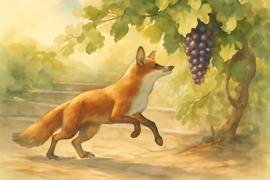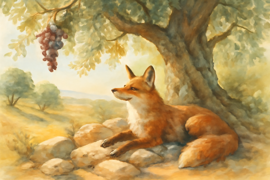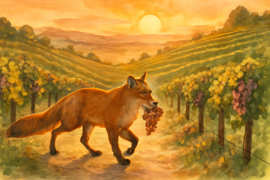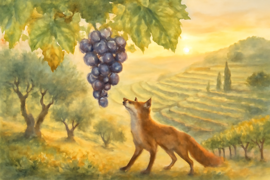Introduction
At dawn on a gentle hillside in ancient Greece, the first light of a golden sun spilled across rows of ripening vines. Dew still clung to the broad leaves of each vine, reflecting speckles of warm color as the breeze stirred the air with promises of a bright day. Beneath the shade of an olive tree at the vineyard’s edge, a lone fox emerged, its russet coat catching shafts of sunlight that trickled through gnarled branches. Its keen amber eyes flicked with curiosity and hunger as they settled on a heavy cluster of grapes, plump and purple, dangling from a vine overhead. The scene seemed painted in soft tones of green and violet, a natural spectacle whispering of abundance and life. Drawn by the sweet scent of the grapes, the fox crouched low, muscles tensing with intent. Each heartbeat pulsed with desire to taste the fruit that appeared just within reach, yet lofted across a gap too wide to bridge with a simple bound. In that quiet moment, time slowed around the sly creature, inviting readers into a world where nature and nuance converge, where one single futile attempt at a tasty reward would set the stage for a timeless lesson on desire and pride.
Perspectives from the Vineyard Hill
On the steep slope of that ancient vineyard, morning light filtered through gnarled vines in a delicate dance of gold and green. Each vine clung to the terraced soil like an old friend holding onto memory and promise. The grapes themselves were small miracles of nature, perfectly round jewels glistening with dew and poised like precious offerings to any hungry observer. At the base of one vine, the fox paused in cautious reverie, nose twitching at the heady aroma of fermentation and sweetness. Ripples of breeze whispered through leaves, carrying scents of olive groves and distant pine, forging an atmosphere thick with anticipation. From a distance, the hillside looked serene and inviting, yet up close it revealed every texture, every flaw in bark and every vein in leaf. The fox’s heart quickened as he took in the scene, mind racing with possibilities. He saw not just fruit, but a moment in time that promised satisfaction and triumph, if only he could devise a way to close the gap between him and that tantalizing cluster of plump purple grapes. For a fleeting instant, the world reduced to that one goal, and every instinct drove him forward with single-minded focus toward the promise of sweetness suspended overhead.

Below him, loose stones crunched underfoot as he adjusted his stance for a better leap. The earth felt firm but unpredictable, a mosaic of warmth and dust that threatened to shift with careless movement. Yet with every breath, he centered his resolve upon the grapes overhead. He imagined the first bite, the rush of juice bursting like summer rain on his tongue, the satisfaction bending his whiskers in a primal grin. Even before any attempt, curiosity and desire intertwined, stirring a restless energy that hummed through every muscle. The vineyard here was no mere backdrop; it was an active partner in his quest, providing both support and challenge. In that moment, he embodied the tension between ambition and limitation that echoed through every den and every human heart alike.
With cautious calculation, the fox measured distance and weight, paws shifting on the terrain’s subtle rise. He lowered his head, braced his hind legs, and launched himself skyward. For a fraction of a heartbeat, he felt alight with potential, as though the world itself had lifted him toward reward. But gravity, like truth, could not be fooled: he fell short, scraping his chest on dusty stones and tasting grit in his mouth. Pain prickled beneath coarse fur, and for a moment the grapes spun above him like silent jests. He staggered to his feet, pride pricked and pulse pounding, readying for the next attempt.
The Burden of Unattained Desire
Stung by the first failure, the fox retreated a moment into the cool shadow of a sun-bleached olive tree. His breaths were ragged whispers against the silent rustle of the vineyard. He lifted his muzzle skyward, nostrils flaring as he drank in the fruit’s sweet perfume. Despite the burn in his throat and the ache in his muscles, an ember of hope glowed bright within. He paced with low steps, each paw leaving a brief imprint in fine soil, and turned his gaze ever upward to those plump orbs.

Around him, life in the vineyard moved on: a pair of doves cooed softly among the leaves, and a goat below nibbled tender shoots on a lower terrace. Their contentment sharpened the fox’s longing, reminding him that others could partake of sustenance. With renewed focus, he assessed the angle of his approach, skirting around protruding roots and positioning himself on firmer ground. Dust climbed from his pelt as he sprang again, limbs stretching to their limit, only to land a whisker-length too early. He lay flat against the earth, the grapes dancing overhead in silent triumph.
A flicker of frustration rippled through his whiskers. Yet as he regained footing, another thought emerged, soft but persistent: perhaps the grapes were sour. Maybe their luscious appearance concealed a harsh tang. He shook his head, dismissing the memory of sweetness, convincing himself that true taste would frown on any tongue that dared aspire too high. Pride flared, and with a defiant toss of his tail, he trotted away in search of simpler fare, prepared to scorn the very bounty he still secretly craved.
Unraveling the Wisdom Behind Sour Grapes
As the fox wandered beyond the vineyard’s edge, his mind circled that stubborn cluster of grapes. The closer he drew, the more he insisted they must taste bitter. Each time he thought of returning, a phrase echoed in his head instilling resolve: better to despise the prize than confess defeat. In this act of self-preservation, he embodied a universal impulse that spans creatures and cultures alike: to rationalize failure by devaluing the lost reward.

Evening approached with a soft glow, and shadows lengthened across the hills. The grapes swung gently in the warm breeze, indifferent to the drama below. They remained unchanged—still ripe, still promising. Their quiet persistence contrasted sharply with the fox’s shifting convictions. What the fox saw as sourness was nothing more than his own wounded pride cloaked in disbelief.
At length, the fox paused once more on a knoll overlooking the vineyard, amber eyes reflecting twilight and regret. He recognized that bitterness can be its own defense, sparing the heart the ache of unmet longing. In that twilight hush, he grasped a fragment of deeper understanding: true wisdom involves both acknowledging our limits and honoring genuine desire. He turned to leave the hillside, carrying with him the lesson that what we cannot have may seem unworthy, yet often we crown our failures with excuses rather than face the truth of our own reach.
Conclusion
Under the quiet sky of ancient Greece, the fox’s tale endures as a mirror for every heart that has ever reached too far. In scorn and in rationalization, we shield ourselves from the sting of unmet hopes. Yet by naming our failures and owning our desire, we transform bitterness into insight, and loss into a path toward self-knowledge. The sour grapes may still hang, bright and unyielding, but the wisdom lies in knowing when to leap—and when to walk away with grace, carrying the lessons we gather on the journey rather than the fruit we could not touch.



















